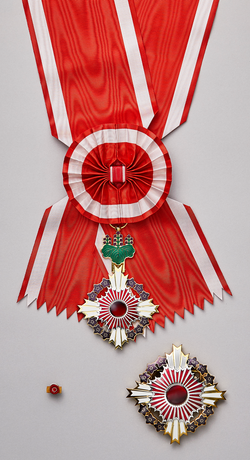
Back وسام زهور الباولونيا Arabic وسام زهور الباولونيا ARZ "Pavlovniya çiçəkləri" ordeni Azerbaijani Řád květů paulovnie Czech Orden de las Flores de Paulownia Spanish نشان گلهای پالونیا Persian Keisaripuun kukkien ritarikunta Finnish Ordre des fleurs de Paulownia French מסדר פרחי הפאולוניה HE Orde Bunga Paulownia ID
| Order of the Paulownia Flowers 桐花章 | |
|---|---|
 Grand Cordon of the Order of the Paulownia Flowers | |
| Awarded by the Emperor of Japan | |
| Type | Order |
| Eligibility | Individuals with many years of outstanding accomplishments, particularly in public and political life. |
| Status | Currently constituted |
| Sovereign | HM The Emperor |
| Grades | Grand Cordon |
| Precedence | |
| Next (higher) | Order of the Chrysanthemum |
| Next (lower) | Order of the Rising Sun Order of the Sacred Treasure Order of the Precious Crown Order of Culture |
Ribbon bar of the order | |
The Order of the Paulownia Flowers (桐花章, Tōka shō) is an order presented by the Japanese government. The award was established in 1888 during the Meiji Restoration as the highest award in the Order of the Rising Sun and has been an Order in its own right since 2003.[1] The only grade of the order is Grand Cordon of the Order of the Paulownia Flowers (桐花大綬章, Tōka daijushō), which ranks higher than the Order of the Rising Sun, the Order of the Sacred Treasure, the Order of the Precious Crown, and the Order of Culture and lower than the Order of the Chrysanthemum.
Traditionally, the order has been conferred upon eminent statesmen, former prime ministers and senior cabinet ministers, diplomats and judges. It may be conferred posthumously, and is the highest regularly conferred honor in the Japanese honours system. Awards are not made annually; only 24 individuals have been decorated with the order since 2003: 18 Japanese (three posthumously), three Americans (one of Japanese descent, United States Senator Daniel Inouye), one Indian (former Prime Minister of India Manmohan Singh), one Singaporean (the first Prime Minister of Singapore Lee Kuan Yew, awarded posthumously) and one Malaysian (the fourth and seventh Prime Minister of Malaysia, Mahathir Mohamad).[2]
- ^ Japan, Cabinet Office: Decoration Bureau
- ^ Cite error: The named reference
:1was invoked but never defined (see the help page).